Descriptive epidemiology Guías de estudio, Notas de estudios & Resúmenes
¿Buscas las mejores guías de estudio, notas de estudio y resúmenes para Descriptive epidemiology? En esta página encontrarás 748 documentos de estudio para Descriptive epidemiology.
Página 3 fuera de 748 resultados
Ordenador por
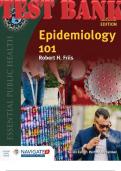
-
TEST BANK for Epidemiology 101 2nd Edition by Robert Friis. ISBN 9781284143768, ISBN 9781284107852 (Complete 12 Chapters)
- Examen • 93 páginas • 2023
-
- $33.11
- + aprende más y mejor
TEST BANK for Epidemiology 101 2nd Edition by Robert Friis. ISBN 9781284143768, ISBN 9781284107852 _TABLE OF CONTENTS_ Chapter 1 History, Philosophy, and Uses of Epidemiology Chapter 2 Epidemiolog y and Data Presentation Chapter 3 Epidemiologic Measurements Used to Describe Disease Occurrence Chapter 4 Data and Disease Occurrence Chapter 5 Descriptive Epidemiology: Patterns of Disease—Person, Place, Time Chapter 6 Association and Causality Chapter 7 Analytic Epidemiology: Types of Study Design...
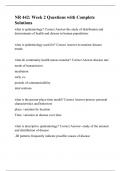
-
NR 442: Week 2 Questions with Complete Solutions
- Examen • 16 páginas • 2024
-
- $15.99
- + aprende más y mejor
what is epidemiology? Correct Answer-the study of distribution and determinants of health and disease in human populations what is epidemiology used for? Correct Answer-to monitor disease trends what do community health nurses monitor? Correct Answer-disease rate mode of transmission incubation early s/s periods of communicability interventions what is the person-place-time model? Correct Answer-person: personal characteristics and behaviors place: variation by location Time: va...
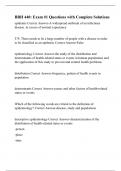
-
BBH 440: Exam #1 Questions with Complete Solutions
- Examen • 17 páginas • 2024
-
- $14.49
- + aprende más y mejor
disease. in excess of normal expectancy T/F: There needs to be a large number of people with a disease in order to be classified as an epidemic Correct Answer-False epidemiology Correct Answer-the study of the distribution and determinants of health-related states or events in human populations and the application of this study to prevent and control health problems distribution Correct Answer-frequency, pattern of health events in population determinants Correct Answer-causes and ot...
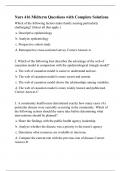
-
Nurs 416 Midterm Questions with Complete Solutions
- Examen • 28 páginas • 2024
-
- $15.49
- + aprende más y mejor
Which of the following factors make family nursing particularly challenging? (Select all that apply.) a. Descriptive epidemiology b. Analytic epidemiology c. Prospective cohort study d. Retrospective cross-sectional survey Correct Answer-A 2. Which of the following best describes the advantage of the web of causation model in comparison with the epidemiological triangle model? a. The web of causation model is easier to understand and use. b. The web of causation model is more rece...

-
Community Health Nursing FINAL EXAM
- Examen • 33 páginas • 2023
-
- $13.99
- + aprende más y mejor
Studies in analytic epidemiology differ from descriptive epidemiology because they seek to answer what kind of questions? - Answer- The WHY questions. Descriptive epidemiology describes the distribution of disease, death, and other health outcomes in the population according to person, place, and time—the who, where, and when of disease patterns. Analytic epidemiology, by contrast, searches for the determinants of the patterns observed—the how and why of disease patterns. Nurses in com...
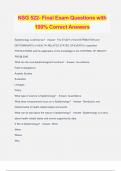
-
NSG 522- Final Exam Questions with 100% Correct Answers
- Examen • 19 páginas • 2024
-
- $13.49
- + aprende más y mejor
NSG 522- Final Exam Questions with 100% Correct Answers Epidemiology is defined as? - Answer- The STUDY of the DISTRIBUTION and DETERMINANTS of HEALTH-RELATED STATES OR EVENTS in specified POPULATIONS and the application of this knowledge to the CONTROL OF HEALTH PROBLEMS What are the core Epidemiological Functions? - Answer- Surveillance Field Investigations Analytic Studies Evaluation Linkages Policy What type of science is Epidemiology? - Answer- Quantitative What does measuremen...
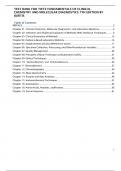
-
TEST BANK FOR TIETZ FUNDAMENTALS OF CLINICAL CHEMISTRY AND MOLECULAR DIAGNOSTICS 7TH EDITION BY BURTIS
- Examen • 67 páginas • 2023
-
- $16.49
- 1x vendido
- + aprende más y mejor
TEST BANK FOR TIETZ FUNDAMENTALS OF CLINICAL CHEMISTRY AND MOLECULAR DIAGNOSTICS 7TH EDITION BY BURTIS Table of Contents PREFACE ............................................................................................................................................... 2 Chapter 01: Clinical Chemistry, Molecular Diagnostics, and Laboratory Medicine ...................... 2 Chapter 02: Selection and Analytical Evaluation of Methods With Statistical Techniques .......... 5 Chapter 03: Clinical...
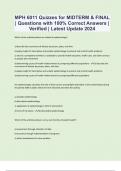
-
MPH 6011 Quizzes for MIDTERM & FINAL | Questions with 100% Correct Answers | Verified | Latest Update 2024
- Examen • 29 páginas • 2024
- Disponible en paquete
-
- $13.49
- + aprende más y mejor
Which of the activities below are related to epidemiology? a) describe the occurrence of disease by person, place, and time b) apply insight for descriptive and analytic epidemiology to prevent and control health problems c) ensure a competent workforce is available to provide health education, health care, and other services to people who need them d) determining causes of health-related events by comparing different populations - a) describe the occurrence of disease by person, place, an...
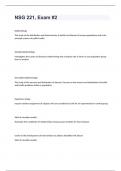
-
NSG 221 Herzing University -NSG 221, Exam #2 correctly answered graded A+
- Examen • 18 páginas • 2024
- Disponible en paquete
-
- $17.99
- + aprende más y mejor
NSG 221, Exam #2Epidemiology The study of the distribution and determinants of health and disease in human populations and is the principle science of public health. Analytic Epidemiology Investigates the causes of disease by determining why a disease rate is lower in one population group than in another. Descriptive Epidemiology The study of the amount and distribution of disease. Focuses on the amount and distribution of health and health problems within a population. Exper...
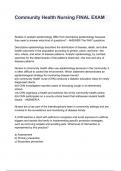
-
Community Health Nursing FINAL EXAM
- Examen • 43 páginas • 2024
- Disponible en paquete
-
- $7.99
- + aprende más y mejor
Studies in analytic epidemiology differ from descriptive epidemiology because they seek to answer what kind of questions? - ANSWER-The WHY questions. Descriptive epidemiology describes the distribution of disease, death, and other health outcomes in the population according to person, place, and time—the who, where, and when of disease patterns. Analytic epidemiology, by contrast, searches for the determinants of the patterns observed—the how and why of disease patterns. Nurses in com...

¿Estrés por los estudios? Para los vendedores en Stuvia, estos son tiempos de oro. ¡KA-CHING! Gana también con tus resúmenes y empieza a subirlos ya. Descubre todo sobre cómo ganar en Stuvia


